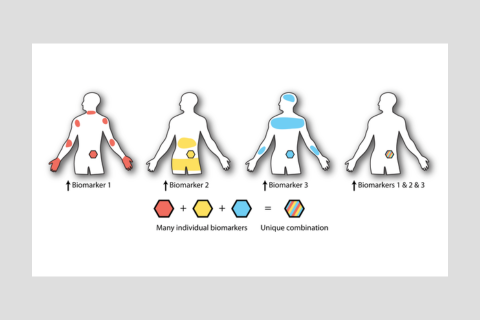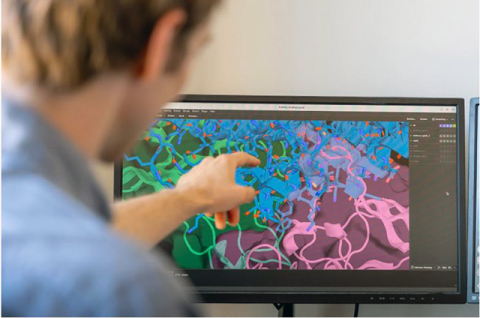
What do ChemE's do in the field of health & medicine?
Innovations made by chemical engineers are reflected in medical advances from devices and imaging to drug delivery and manufacturing. Chemical engineers are able to understand the way multi-component processes interact in a complex system across length and time scales, which makes them especially well suited for engineering applications for the human body. For example, they may model fluid flows such as blood through the heart to learn how stress on the vessel wall changes; design treatments that can reach a diseased site in the body; or engineer materials that can replicate spatial and temporal properties of a tissue.
Why choose chemeStudents interested in bioengineering often find chemical engineering may be a better fit for them! WHY?
Chemical engineers are able to understand the way multi-component processes interact in a complex system across length and time scales, which makes them especially well suited for engineering applications for the human body. For example, they may model fluid flows such as blood through the heart to learn how stress on the vessel wall changes; design treatments that can reach a diseased site in the body; or engineer materials that can replicate spatial and temporal properties of a tissue. What differentiates ChemEs in these areas is that ChemEs must think about scale with constraints, both in terms of manufacturing and distribution of products being used in medicine or interfacing with biology systems, and in terms of economic, environmental, and societal impact.
Both ChemE and BioE are good pathways for students considering medical or other health professional school following their engineering degree. About 85% of chemical engineering graduates go straight to industry, with the remaining 15% going to graduate or professional school immediately following graduation.
Electrical engineers and chemical engineers are both critical contributors to advances in health & medicine, but each plays different and complementary roles. Electrical engineers are specialists in devices, smart integration and autonomous drug delivery systems which support personalized medicine at the doctor-patient level. Chemical engineers identify, interrogate, and modulate interactions within and across cells to engineer their function and develop cell-free devices. They also develop predictive computational models across scales (from subcellular to organ level), and integrate advances in materials science, bioengineering, and electrical engineering toward these goals. Chemical engineers are also deeply involved in the manufacturing scale up of medical advances of all types to ensure that a given medical advancement can be affordable, safe, consistent, and get to where it needs to go. Electrical engineers dig deeper into system identification, network theory, and control theory while chemical engineers focus more on applications.
What problems are chemical engineers trying to solve in health & medicine?
Chemical engineers design, build and analyze processes at a range of size and time scales. ChemE's work on:
- How can we scale up a process developed in a lab to reach as many people as possible?
- How can we deliver drugs right to the site they’re needed AND produce them in a way that people can afford to take them?
- Can we optimize processes to be more economical, environmentally friendly, and safe?
Customize ChemE to YOUR interests
ChemE is a cohort-based program, which means you never have to worry about when to take core classes or whether there will be space when you need it. You'll be able to focus on developing relationships with your classmates, faculty members, and advisers, as well as customizing your experience to your interests. While ChemE is a broad degree, we provide guidance to help students identify and pursue their interests while developing the strong fundamental perspective that all ChemEs bring. We encourage students to take ownership over their education to make the most of their time in chemical engineering.
All ChemE students take at least 16 credits of engineering electives. Some students choose a broad array of electives and others choose to focus most of their electives in a specific area of their interest, called an optional focus area. Here are some examples of engineering electives, areas of knowledge, and focus areas that relate to Health & Medicine. Note that many BIOEN courses list BIOEN 315 as a prerequisite; they also accept CHEM E 310.
- CHEM E 355: Biological Frameworks for Engineers (3)
- CHEM E 434: Physiological Transport Processes
- CHEM E 458: Surface Analysis (3)
- CHEM E 490: Engineering Materials for Biomedical Applications (3)
- CHEM E 491: Controlled-Release Systems (3)
- CHEM E 493: Advanced Surface Analysis (3)
- BIOEN 420: Medical Imaging (4)
- BIOEN 440: Introduction to Biomechanics (4)
All ChemE students take at least 24 credits of Areas of Impact, including at least 3 credits of DIV, 10 credits of VLPA, and 10 credits of I&S. We encourage students to consider using these credits as another way to deepen knowledge and gain a breadth of perspective on the areas of interest to them. Here are some examples of Areas of Knowledge courses that relate to Health & Medicine
- ANTH 303 Technologies of Health (I&S or VLPA)
- PHIL 242 Introduction to Medical Ethics (I&S or VLPA)
- ANTH 474 Social Difference and Medical Knowledge (I&S and DIV)
- BIOL 380 Biomedical Advances and Society (I&S)
- ANTH 215 Intro to Medical Anthropology and Global Health (I&S and DIV)
- ANTH 308 Anthropology of Gender, Women’s Health, and Reproduction (I&S and DIV)
- B E 220 Cities, Health and Well-Being (I&S)
- B H 456 Social Justice and Health (I&S)
- HSERV 246 Using Economics to Solve Today’s Healthcare Problems (I&S)
A large proportion of students study abroad while earning their chemical engineering degrees for both summer and autumn quarters, with courses counting toward engineering electives and core coursework. Health-related programs include:
Study abroad opportunitiesOver 70% of BS ChemE students participate in undergraduate research while earning their degrees. Students can do undergraduate research in any engineering lab and count up to 9 credits toward engineering electives for degree requirements. Most research opportunities are not posted on the website. The best way to get involved is to read about the faculty on our research pages and email the professor you're most interested in researching with to see if they have space in their lab. ChemE faculty are on the cutting edge of research in the following areas:
- Regenerative medicine
- Advanced therapeutic delivery
- Neuromedicine
- Nanomedicine
- Metabolic engineering
- Synthetic & systems biology
- Biomaterials
- Protein engineering
- Environmental engineering
- Medical diagnostics
- Sensing technologies
All ChemE students take a senior design course or a capstone course. The standard option is CHEM E 486, but many students choose a multi-quarter capstone option
Engineering Innovation in Health
Engineering Innovation in Health is a three-quarter design sequence focusing on developing engineering solutions to pressing challenges in medicine. Students from across the engineering disciplines will work with doctors and engineering faculty to understand the clinical need as well as design, fabricate, and test a working prototype device. Students receive credit for both the capstone and engineering electives. (M E 414, M E 416, M E 495).
Industry Capstone Program
The Industry Capstone Program brings together UW students and companies to tackle real-world, multidisciplinary engineering problems. Sponsors bring in projects from their companies and provide support to teams of creative, talented engineering students who will design and build innovative solutions.
Entrepreneurial Design Sequence
This is a three-quarter design sequence in which small teams of ChemE students research, design, and develop a business plan for a new product. Teams participate in the NW Business Plan Competition. Students receive credit for both the capstone and engineering electives. (CHEM E 499, CHEM E 497) Examples:
- ElectroSolar Oxygen: An award-winning capstone design's simple formula for generating medical oxygen in underserved areas (2020)
- Pallicera developed a new drug formulation to mask taste for essential but bitter drugs for children. (2020)
- Novo Nordisk InsuCon: Insulin Pen Injection Confirmation (2020)
- Stryker C-O-You: Custom etCO2 Validation (2020)
- Novo Nordisk: High-Throughput Peptide Library Purification (2019)
- Large-scale Manufacturing facility for vaccine production (2014)
- Zetection: development of improved medical diagnostics with zwitterionic materials (2014)
- Aurora Plasmonics: Plasmonic emulsions for biomedical applications (2014)
Pre-health planning
The B.S. ChemE degree trains you to break down a system into its fundamental components, analyze and evaluate these fundamentals, then build back up to a whole system-level understanding. This is an excellent and valuable approach to medicine, where treating disease requires an awareness of the collective system (the body) and the underlying principles that influence its health. ChemE is a great path for students considering medicine and other health-professions, so we have a dedicated faculty adviser and advising resources page just for pre-health students.
Nano and Molecular Engineering option
The NME option introduces students to nanoscale principles in molecular engineering, provides hands-on experience and stresses the interdisciplinary of this field. Students who complete the option have it noted on their transcript after graduation.
Optional focus areas
Students who wish to deepen their knowledge in a specific subject may pursue an optional focus area, combining engineering electives, undergraduate research, study abroad, internship, and capstone experience to create an individualized learning experience that is in-depth in a specific area. Students who complete a focus area will receive a certificate at graduation.
Where do ChemE alumni go in the field of health & medicine?
ChemE alumni work on improving drug delivery, imaging, diagnostics, and other problems requiring an understanding of transport processes and chemical reactions within the body. Many alumni pursue careers in synthetic biology, biotechnology, and pharmaceuticals. We also have alumni who are pursuing careers as medical doctors or as health-focused researchers in academic institutions.
Common employers:
- W.L. Gore
- Juno Therapeutics
- Just Evotec Biologics
- Bristol Myers-Squibb
- National Institutes of Health
- Philips Healthcare
Common titles in industry:
- Process Engineer
- Project Engineer
- Test Engineer
- Manufacturing Engineer
- Quality Engineer
- Procurement Engineer



